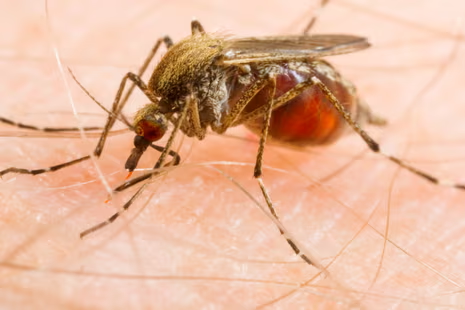Massachusetts health officials confirmed a second human case of Eastern Equine Encephalitis (EEE) on Thursday, heightening concerns about the mosquito-borne illness just days after a New Hampshire man succumbed to the disease. This latest case involves a woman in her 30s from the Plymouth County area, according to the Massachusetts Department of Public Health.
The woman is believed to have been exposed to EEE before recent aerial spraying operations in the region, which took place on Tuesday night. Concurrently, officials reported the state’s second equine EEE case in the same area, underscoring the elevated risk in the region.

Plymouth County has been a focal point for EEE activity, with EEE-positive mosquito samples detected in multiple towns including Abington, Carver, Halifax, Kingston, Marion, Middleboro, Plymouth, Rochester, Wareham, and Whitman.
This latest human case follows the first reported instance this year in Massachusetts, involving a man in his 80s from southern Worcester County. The resurgence of EEE in the state is notable, as the last human case prior to this year occurred in 2020.
The confirmation of these cases comes in the wake of a tragic EEE-related death in neighboring New Hampshire. Steven Perry, a 41-year-old man described by family as healthy and active with no underlying conditions, died within a week of being hospitalized with EEE-induced brain damage. This marks New Hampshire’s first human EEE case since 2014, when three people were infected and two died.
In response to the growing threat, Massachusetts communities are taking proactive measures. In Plymouth, the high school football season opener scheduled for Friday will be played in the afternoon as a precaution, with outdoor fields being closed from dusk to dawn. Playgrounds and other parks are also implementing dusk closures. In Oxford, officials have established a recommended curfew on town properties after 6 p.m.

Dr. Catherine Brown, Massachusetts state epidemiologist, emphasized the ongoing risk, stating, “EEE risk does not end on Labor Day. We continue to strongly advise that individuals in areas where EEE risk is at high and critical levels reschedule evening outdoor events to avoid peak mosquito biting hours.”
Health officials are urging the public to take preventive measures against EEE, which is rare but can be fatal to people of all ages. The Massachusetts Department of Public Health recommends using insect repellent containing DEET, wearing long-sleeved shirts and pants when outdoors, avoiding outdoor activities between dusk and dawn, and draining standing water from rain gutters, wading pools, or flowerpots to prevent mosquito breeding.
As the situation develops, state and local health departments are closely monitoring mosquito populations and EEE activity. The public is advised to stay informed about local risk levels and follow guidelines to protect themselves and their communities from this serious mosquito-borne illness.



